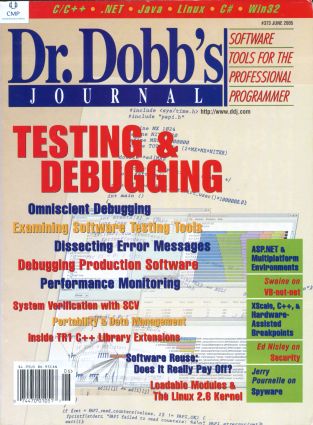
Editorial
[author : Jonathan Erickson] #Edito
TABLE OF CONTENTS
FEATURES
Omniscient Debugging
[author : Bil Lewis]
With omniscient debugging, you know everything about the run of a program—from state changes to the value of variables at any point in time.
Examining Software Testing Tools
[author : David C. Crowther and Peter J. Clarke]
Our authors examine class-based unit testing tools for Java and C#.
Dissecting Error Messages
[author : Alek Davis]
Error messages are the most important information users get when encountering application failures.
Debugging Production Software
[author : John Dibling]
The Production Software Debug library includes utilities designed to identify and diagnose bugs in production software.
System Verification with SCV
[author : George F. Frazier]
The SystemC Verification Library speeds up verification of electronic designs.
Portability & Data Management
[author : Andrei Gorine]
Following rules for developing portable code simplifies the reuse of data-management code in new environments.
Performance Monitoring with PAPI
[author : Philip Mucci, Nils Smeds, and Per Ekman]
The Performance Application Programming Interface is a portable library of performance tools and instrumentation with wrappers for C, C++, Fortran, Java, and Matlab.
The Technical Report on C++ Library Extensions
[author : Matthew H. Austern]
Matt looks at what the Technical Report on C++ Library Extensions means for C++ programmers.
Measuring the Benefits of Software Reuse
[author : Lior Amar and Jan Coffey]
Does software reuse really pay off in the long run? How can you tell?
Loadable Modules & the Linux 2.6 Kernel
[author : Daniele Paolo Scarpazza]
The Linux Kernel 2.6 introduces significant changes with respect to 2.4.
ASP.NET & Multiplatform Environments
[author : Marcia Gulesian]
Running .NET web apps in the enterprise means accommodating myriad servers and browsers.
EMBEDDED SYSTEMS
Hardware-Assisted Breakpoints
[author : Dmitri Leman]
Dmitri explains how to access debug registers on XScale-based CPUs from C/C++ applications.
COLUMNS
Programming Paradigms
[author : Michael Swaine]
Embedded Space
[author : Ed Nisley]
Chaos Manor
[author : Jerry Pournelle]
Programmer's Bookshelf
[author : Gregory V. Wilson]
FORUM
Letters
[author : you]
Dr. Ecco's Omniheurist Corner
[author : Dennis E. Shasha]
News & Views
[author : Shannon Cochran]
Of Interest
[author : Shannon Cochran]
Swaine's Flames
[author : Michael Swaine]
